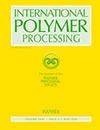An experimental validation of diffusion-based devolatilization models in extruders using post-industrial and post-consumer plastic waste
IF 1.1
4区 工程技术
Q4 ENGINEERING, CHEMICAL
引用次数: 0
Abstract
Extrusion is a key process in mechanical recycling. In a degassing step, volatile components, including all impurities and moisture, are removed from a polymer melt to ensure consistently high quality of the recyclates. Predicting devolatilization performance is therefore of interest in the design of degassing screws; in the plastics industry, it also plays an important role in the transition from a linear to a circular economy. Using two different devolatilization models, we first modelled the degassing process of a lab-scale twin-screw extruder and an industrial-scale recycling single-screw extruder. We then predicted the devolatilization performance of both machines, validated the results with experimental data obtained from emissions tests carried out with post-industrial and post-consumer polypropylene materials and performed linear regression analysis to compare our two models in terms of predictive quality. Our results showed that both models are equally suitable for reliable prediction of the devolatilization performance.通过实验验证使用工业后和消费后塑料废弃物的挤出机中基于扩散的脱溶模型
挤压是机械回收的关键工序。在脱气步骤中,聚合物熔体中的挥发性成分(包括所有杂质和水分)被去除,以确保回收物始终如一的高质量。因此,预测脱气性能对脱气螺杆的设计很有意义;在塑料工业中,预测脱气性能对从线性经济向循环经济过渡也起着重要作用。利用两种不同的脱胶模型,我们首先模拟了实验室规模的双螺杆挤出机和工业规模的回收单螺杆挤出机的脱气过程。然后,我们预测了这两种机器的脱气性能,并用使用工业后和消费后聚丙烯材料进行的排放测试所获得的实验数据验证了结果,并进行了线性回归分析,以比较两种模型的预测质量。我们的结果表明,这两个模型同样适用于对脱胶性能进行可靠的预测。
本文章由计算机程序翻译,如有差异,请以英文原文为准。
求助全文
约1分钟内获得全文
求助全文
来源期刊

International Polymer Processing
工程技术-高分子科学
CiteScore
2.20
自引率
7.70%
发文量
62
审稿时长
6 months
期刊介绍:
International Polymer Processing offers original research contributions, invited review papers and recent technological developments in processing thermoplastics, thermosets, elastomers and fibers as well as polymer reaction engineering. For more than 25 years International Polymer Processing, the journal of the Polymer Processing Society, provides strictly peer-reviewed, high-quality articles and rapid communications from the leading experts around the world.
 求助内容:
求助内容: 应助结果提醒方式:
应助结果提醒方式:


